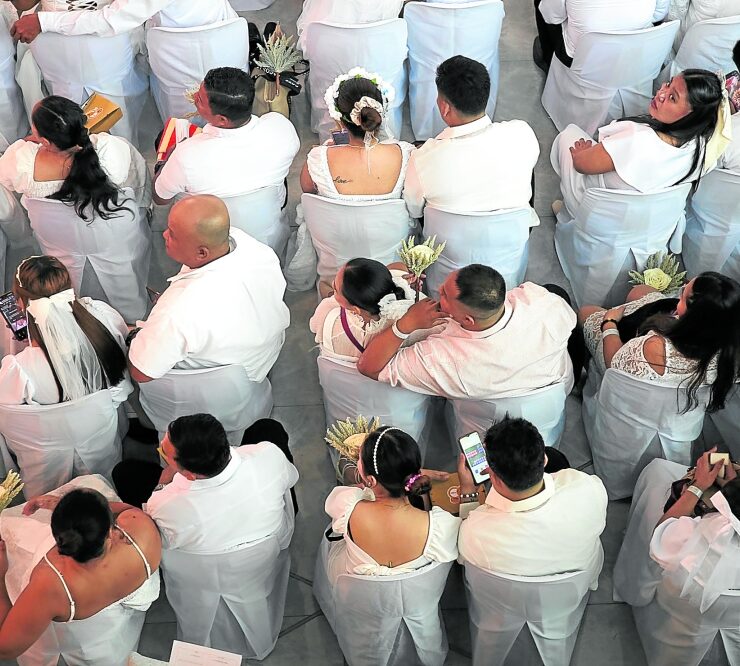Rizal’s unhappy wife

Josephine Bracken, Jose Rizal’s common-law wife, lived a short life, alternating between romance and tragedy. Displayed in the National Museum is a copy of Thomas à Kempis’ “Imitation of Christ” inscribed “to my dear and unhappy wife Josephine.” Furthermore, Rizal publicly acknowledged her in the final stanza of the “Mi último adiós.” She was immortalized with the words “Adios dulce extranjera, mi amiga, mi alegria!” wonderfully rendered into English by Nick Joaquin as “Farewell sweet foreigner—my darling, my delight!” On the block at Leon Auctions next week is a small plaster sculpture by Rizal depicting her asleep, naked under a blanket. It is a touching memento of their bliss in Dapitan.
Bracken was an orphan. She arrived in Dapitan sometime in February 1895 to accompany her stepfather, George Taufer, whose eyes required specialist treatment from Rizal. Bracken and Rizal fell in love, and Rizal gave her the choice to return to Hong Kong with her stepfather or return to Dapitan after her father had set sail in Manila in July 1895. This much we can guess from a short poem Rizal composed before her departure from Dapitan:
“Josefina, Josefina/ to these shores you came in quest/ of a dwelling place, a nest/ like an emigrating swallow/ if your fortune you must follow/ to Shanghai, China, or Japan/ don’t forget that on these shores/ beats for you the heart of one,” (Nick Joaquin’s translation from the original Spanish).
While all these sound very romantic, Bracken’s light was a mere reflection from the sun that was Rizal. After Rizal’s execution, Bracken, together with Paciano and Rizal’s sisters traveled to Cavite where the “La viuda de Rizal” inspired ill-equipped, hastily trained revolutionaries to fight. At the end of May 1897, Bracken sailed home to Hong Kong and the obscurity she started from. Her disappearance from Philippine history is partly due to the legal suit she brought upon Rizal’s mother in 1902 claiming that Rizal’s last will and testament provided $1,000 for her, Rizal’s library in Hong Kong to Ferdinand Blumentritt, and leaving the paintings of Luna and Hidalgo for disposal. Two little-known letters in the National Library are reproduced below to put the 1902 lawsuit in context:
“Hong Kong 9th November 1897.
“Prof. F. Blumenttrit [sic]
“My most appreciated and respectful friend. You must excuse me for the delay in answering your kind letter, because I have been very ill, but you must imagine dear friend what a joy it was for me to receive your ever welcome letter dated the 7th July. I thought that you are not to answer my letters, but I see, that it was a letter that touched my heart ad brought tears in my eyes. Before going any further in my letter I think it is my duty to inquire first how are your kind famialy [sic] getting on. Hoping they are enjoying good health. By receiving letters from you it reminds me the time that I was staying in Dapitan, because whenever he received any letter from you he will always tell me that he received an apricated [sic] letter from his friend, a friend that he adored so much. Yes, time has changed he is now 11 months under his solemn grave.
“Well I must bid you good dear friend because the mail closes at 10 a.m. With findest love to Mrs. Blumintrit [sic] and Children
“I remain Yours Sincerely, Josephine Rizal.”
In the second letter, reference is made to a will that neither she nor the Rizal family could produce because the hero died intestate:
“HongKong 29th November 1897.
“Professor Fernando Blumentrit [sic]
“Respectiable [sic] Friend:
“I let you know by these few lines that my late husband Dr. J. Rizal left all his books to you. There are three bookcases I mean libry [sic] in care of Mr. Jose Maria Basa house I opened the Will last month and found that the bookcases were for you, he very often told me that those books cost him 3000$. I asked Mr. Basa for the books and he denied them, I think it is better for you to write over and ask him for the things that my husband left for you.
“Yes; dear friend the Philipines [sic] out here now they are not Gentlemen, they deceived me a great deal their [sic] were 1000$ given to Rizal by the Free Mason Lodge so it was to be given to me but they took it and spent it all. I think it is the best thing for you to give me a letter to hand the book cases to me and I will sent [sic] it over to you, because Mr. Basa is selling all the best books. I have lots of troubles with the Philipines [sic] they are not what I thought them to be, I took them to be like my husband, but I see that I am deceived.
“Hoping that all your famailly [sic] are enjoying good health, and please escuse [sic] my letter if it is badly written because I am with a strong feavour [sic].
“With my warmest Affection and respects to yourself and famailly [sic]. I remain, Your sincerest friend Josephine Rizal.
“My address Mrs. Josephine Rizal c/o Mr. J. Goodchild. Thomas Grill Room. Hongkong.”
Bracken lost the case and died of miliary tuberculosis on March 14, 1902. She was buried in an unmarked pauper’s grave.
————–
Comments are welcome at aocampo@ateneo.edu
Ambeth is a Public Historian whose research covers 19th century Philippines: its art, culture, and the people who figure in the birth of the nation. Professor and former Chair, Department of History, Ateneo de Manila University, he writes a widely-read editorial page column for the Philippine Daily Inquirer, and has published over 30 books—the most recent being: Martial Law: Looking Back 15 (Anvil, 2021) and Yaman: History and Heritage in Philippine Money (Bangko Sentral ng Pilipinas, 2021).





















